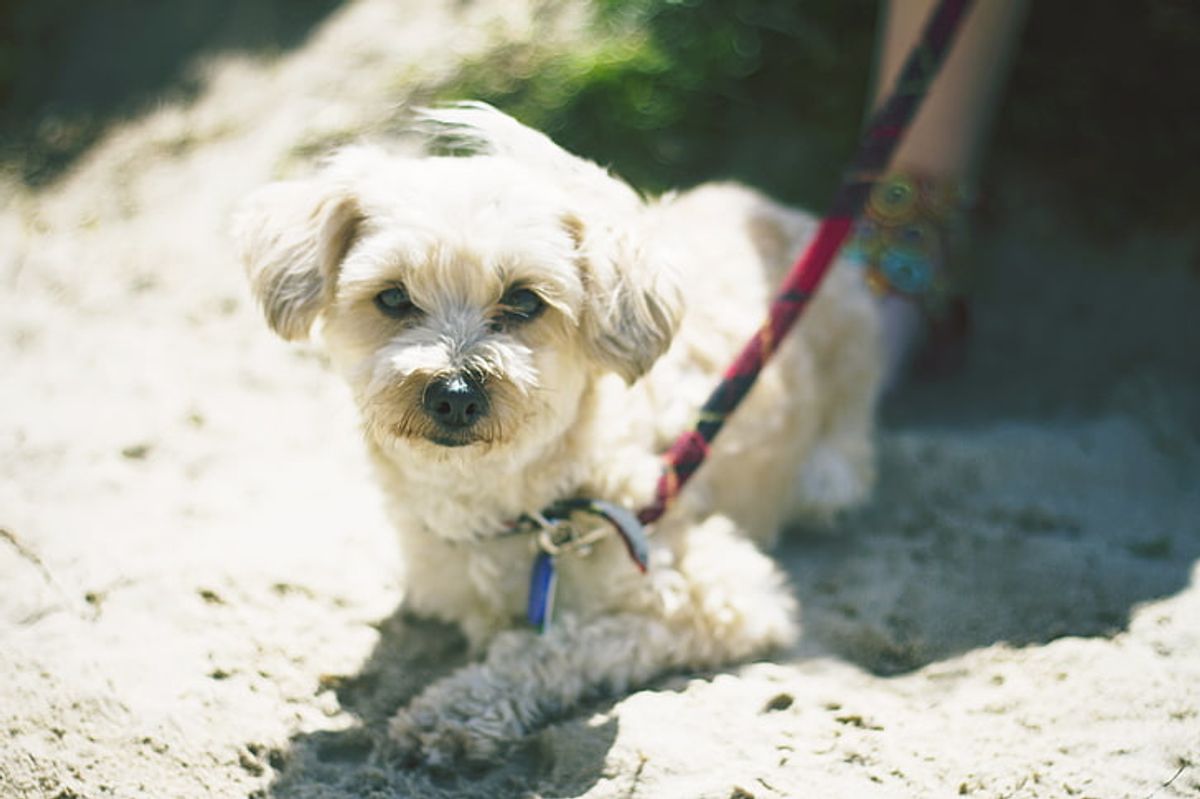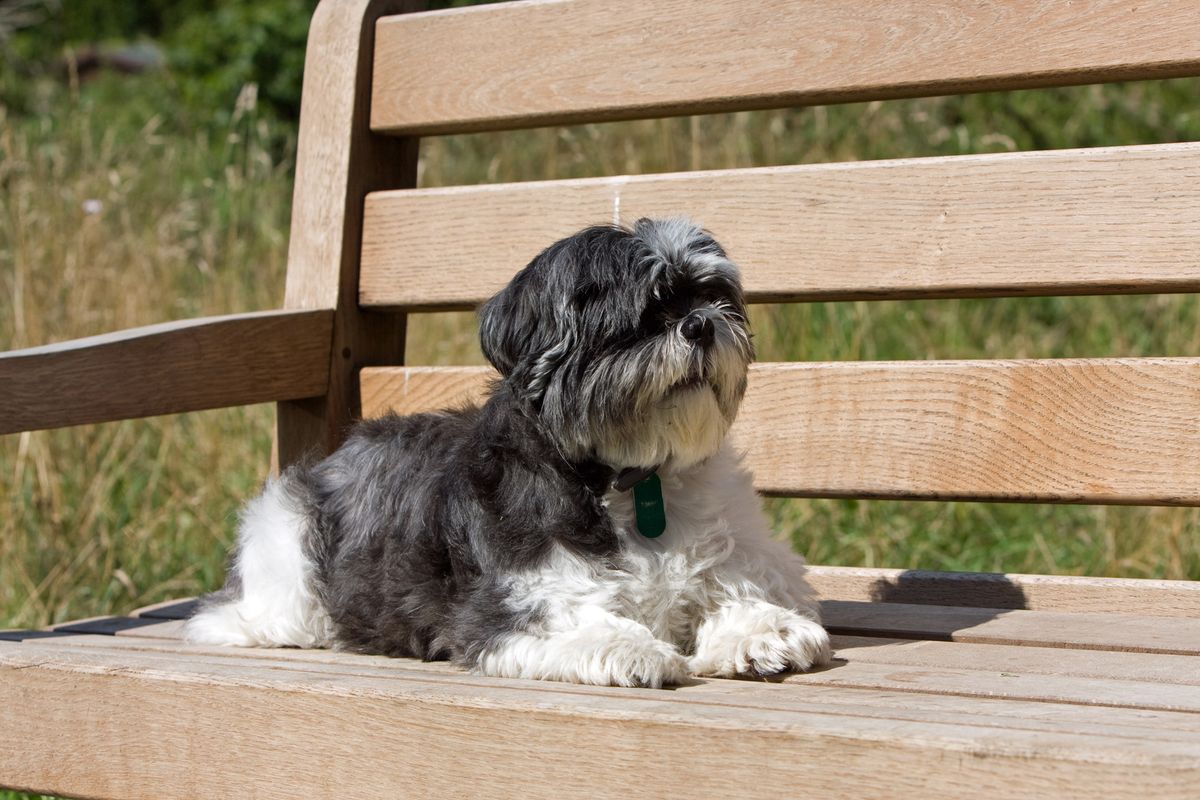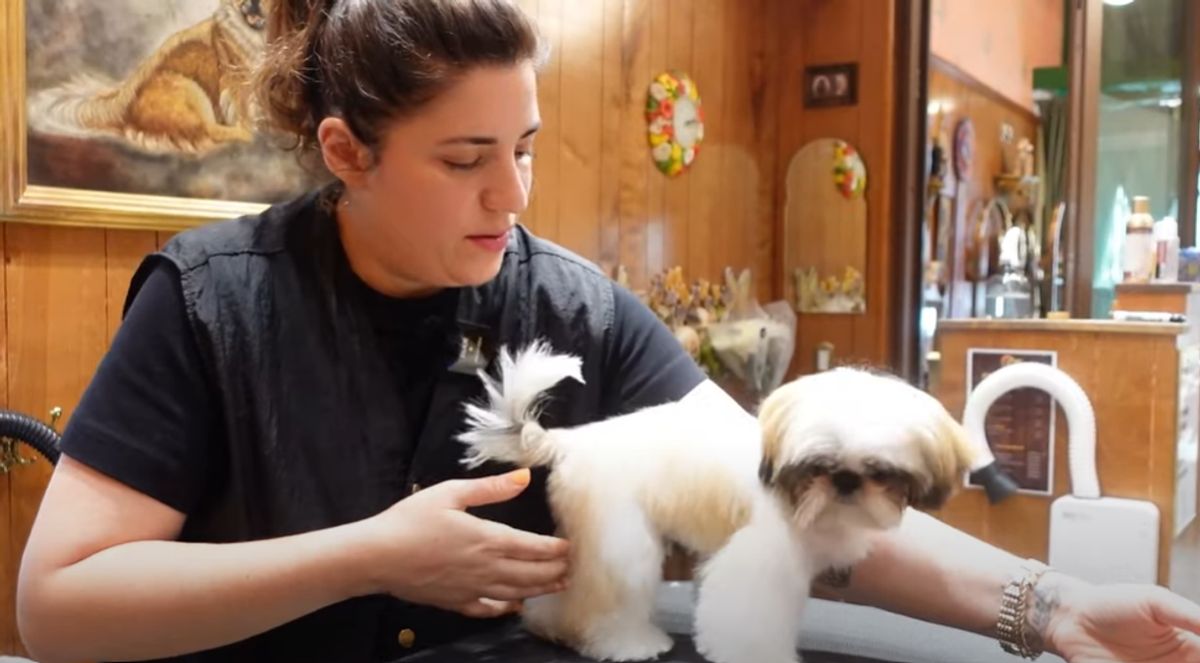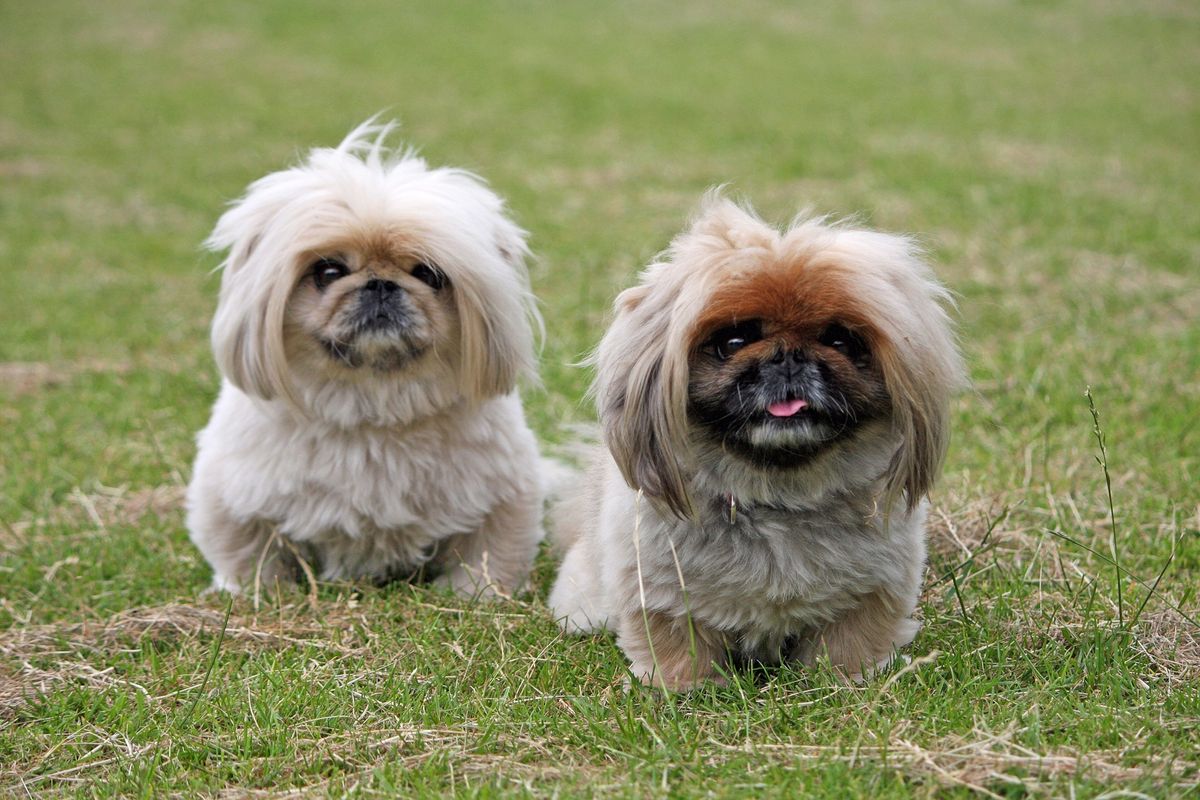Shih Tzus, with their friendly disposition and adorable looks, are cherished pets, but they can suffer from anxiety just like any other dog. Understanding the signs of anxiety and learning how to manage it are crucial for maintaining the well-being of these small, affectionate companions. This article explores a variety of strategies to help calm an anxious Shih Tzu, from behavioral techniques and natural remedies to innovative products and professional advice.
Key Takeaways
- Identifying signs of anxiety, such as shaking or hiding, is the first step to helping your Shih Tzu cope with stress.
- Behavioral modification, routine structuring, and socialization can significantly reduce anxiety without the need for medication.
- Natural remedies and supplements, including herbal ingredients and pheromone sprays, offer a non-pharmaceutical approach to calming anxious dogs.
- Innovative products like Thundershirts and calming collars can provide immediate relief for anxiety symptoms in Shih Tzus.
- Professional help from a veterinarian or a dog behaviorist should be sought if anxiety persists or if the dog exhibits severe symptoms.
Understanding Shih Tzu Anxiety

Identifying Signs of Anxiety in Shih Tzus
Recognizing the signs of anxiety in Shih Tzus is crucial for early intervention and management. Anxious behaviors can manifest in various ways, ranging from subtle to more overt signs. Here’s a list of common indicators that your Shih Tzu might be experiencing anxiety:
- Shaking or shivering
- Yawning excessively
- Drooling or panting more than usual
- Ears held back or down
- Sweaty paws
- Frequent vocalizations such as barking or whining
- Hiding or curling into a ball
- Showing teeth or snapping
- Tail tucking
Anxiety in Shih Tzus can lead to a range of behavioral issues, from mild unease to severe distress. It’s important to observe your pet closely and note any changes in behavior that may suggest anxiety.
If your Shih Tzu exhibits any of these behaviors, especially in response to specific triggers or changes in their environment, it may be time to explore calming techniques and solutions. Early recognition and response can help prevent the development of more serious anxiety-related problems.
Common Triggers and Causes of Anxiety
Shih Tzus, like all dogs, can experience anxiety triggered by a variety of factors. Understanding these triggers is crucial for managing and reducing anxiety in your pet. Some common causes of anxiety in Shih Tzus include:
- Loud noises, such as thunderstorms or fireworks
- Changes in environment or routine
- Separation from their owners
- Encounters with unfamiliar people or animals
Each dog is unique, and what may be a trigger for one Shih Tzu might not affect another. It’s important to observe your dog’s behavior to identify their specific stressors.
Anxiety can manifest in different ways, and recognizing the signs is the first step towards helping your Shih Tzu cope with their stress.
When considering the triggers of anxiety, it’s also essential to note that some situations can exacerbate the condition. For example, encountering a garbage truck or wildlife during walks can be particularly stressful for some dogs. By identifying these triggers, you can take proactive steps to avoid or desensitize your Shih Tzu to these stressors, creating a calmer and happier environment for them.
The Impact of Anxiety on Shih Tzu Behavior and Health
Anxiety in Shih Tzus can manifest in various behavioral changes that may be concerning for pet owners. Shih Tzus experiencing anxiety may become more withdrawn or exhibit signs of aggression as a defensive response to perceived threats. This can lead to a disruption in their daily routines and negatively impact their overall well-being.
Anxiety not only affects behavior but can also have detrimental effects on a Shih Tzu’s health. Chronic stress can weaken the immune system, making them more susceptible to illnesses.
It’s crucial to address anxiety promptly to prevent long-term health issues. Regular check-ins with a vet are recommended to monitor your dog’s progress and adjust treatment plans as necessary. While some may require long-term medication, others might benefit from behavioral therapies or a combination of both.
Behavioral Techniques for Anxiety Reduction

Reward-Based Behavior Modification Strategies
Reward-based behavior modification strategies are a cornerstone of addressing anxiety in Shih Tzus. By rewarding calm behavior, owners can positively reinforce the desired state of mind in their pets. This approach involves offering treats, praise, or playtime when the dog exhibits signs of relaxation or non-anxious behavior, especially in the presence of known triggers.
- Start with Distance: Keep a safe distance from potential triggers that do not provoke fear in your Shih Tzu.
- Reward Calm Behavior: Provide treats and praise when your dog remains calm.
- Focus Training: Practice exercises that help your Shih Tzu focus on you instead of the anxiety-inducing stimulus.
- Gradual Exposure: Slowly introduce your dog to the triggers in a controlled manner to desensitize them over time.
Consistency is key in reward-based training. It’s important to maintain a calm demeanor and avoid adding tension, which can exacerbate anxiety. Use a lead to manage encounters and choose quieter times for walks to practice these techniques without overwhelming your Shih Tzu.
The Role of Routine and Structure in Calming Anxious Shih Tzus
Establishing a consistent routine is crucial for Shih Tzus dealing with anxiety. A structured daily schedule provides predictability, which can significantly reduce stress and create a sense of security for your pet. This routine should encompass regular feeding times, walks, play sessions, and quiet times, allowing your Shih Tzu to anticipate and prepare for each part of their day.
- Feeding: Same time each day
- Walks: Consistent routes and times
- Play: Scheduled playtime with favorite toys
- Quiet Time: Designated periods for rest and relaxation
By adhering to a routine, you signal to your Shih Tzu that their environment is stable and controlled. This can help alleviate the feeling that they need to be in charge, which is often a source of anxiety. It’s important to be patient as some dogs may struggle with adapting to new routines.
Maintaining a routine promotes stability and reduces anxiety, creating a safe environment where they can flourish.
Remember, while routine is important, flexibility is also key. Life can be unpredictable, and your Shih Tzu should also learn to cope with minor changes without becoming overly anxious.
Socialization and Desensitization Exercises
Socialization and desensitization are critical components in managing Shih Tzu anxiety. By gradually exposing your Shih Tzu to a variety of stimuli, you can help them become more comfortable in different environments and situations. This process should be done slowly and patiently, ensuring that your dog does not become overwhelmed.
- Start with familiar, non-threatening environments and slowly introduce new people, sounds, and experiences.
- Keep sessions short and positive, using treats and praise to reinforce calm behavior.
- Monitor your Shih Tzu’s body language closely, and retreat if they show signs of stress.
Consistency is key in socialization and desensitization exercises. Regular, controlled exposure can significantly reduce anxiety levels over time.
Remember, the goal is not to flood your Shih Tzu with stimuli but to create positive associations with new experiences. This approach can help build confidence and reduce the likelihood of anxiety-related behaviors.
Natural Remedies and Supplements

Herbal Supplements and Their Calming Effects
Herbal supplements are gaining popularity as a natural way to alleviate anxiety in Shih Tzus. Chamomile, l-tryptophan, l-theanine, and lavender are among the common ingredients found in these supplements due to their soothing properties. For instance, l-tryptophan is known to increase serotonin levels, often referred to as the ‘happy’ chemical, while melatonin, another supplement, has a calming effect on dogs.
When considering herbal supplements, it’s important to look for products that are professionally formulated and third-party lab tested to ensure safety and efficacy. Here’s a brief overview of some calming ingredients and their benefits:
- Chamomile: Promotes relaxation and sleep.
- L-Tryptophan: Increases serotonin levels for better mood regulation.
- L-Theanine: Helps to reduce stress and anxiety.
- Lavender: Known for its calming scent and stress-relief properties.
While these natural remedies can be helpful, it’s crucial to consult with a veterinarian before introducing any new supplement to your Shih Tzu’s diet, especially if they are already on other medications.
Keep in mind that the effectiveness of these supplements can vary based on the individual dog’s response and the severity of their anxiety. It’s also worth noting that while some products may be more expensive, they often offer a potent calming effect and come with satisfaction guarantees, making them a worthwhile investment for the well-being of your anxious Shih Tzu.
The Benefits of Pheromone Sprays and Diffusers
Pheromone sprays and diffusers are a non-invasive solution to help ease anxiety in Shih Tzus. These products mimic the natural chemicals, or pheromones, that dogs release to communicate a sense of security and well-being. When introduced into the environment, these artificial pheromones can promote a calming effect, particularly beneficial for issues like separation anxiety.
Pheromone-based products are designed to trigger a natural calming response without the need for medication. They are widely recognized for their ease of use and can be particularly effective when combined with other anxiety-reducing strategies.
While the effectiveness of pheromone products can vary from dog to dog, many pet owners report noticeable improvements in their Shih Tzu’s anxiety levels. It’s important to consider the following points when opting for pheromone therapy:
- Ensure the product is specifically designed for dogs.
- Use the sprays or diffusers in the area where your dog spends most of their time.
- Monitor your pet’s response to the product and adjust usage as needed.
- Consult with a veterinarian if you’re unsure about the suitability of pheromone products for your pet.
Calming Treats and Their Ingredients
Calming treats are a popular choice for pet owners looking to ease their Shih Tzu’s anxiety. These treats often contain a blend of natural ingredients known for their soothing properties. Common components include chamomile, valerian root, and L-Tryptophan, all of which have been used to instill calm in anxious dogs.
Calming treats for dogs help level a dog’s behavior, especially in stressful moments, making them a valuable tool for managing anxiety.
Here’s a quick look at what you might find in a typical calming treat:
- Chamomile: A gentle sedative that promotes relaxation.
- Valerian Root: Helps to reduce stress and anxiety levels.
- L-Tryptophan: An amino acid that converts to serotonin, improving mood and promoting calmness.
- L-Theanine: Often found in green tea, it aids in reducing anxiety and stress.
- CBD: Some treats include CBD, which has been shown to help alleviate anxiety in pets.
It’s important to consider the dosage and whether the treats are appropriate for your pet’s size and level of anxiety. Always consult with your veterinarian before introducing any new supplements to your Shih Tzu’s diet.
Innovative Anxiety Relief Products

Understanding How Thundershirts Work
ThunderShirts have become a popular solution for pet owners seeking a non-pharmacological option to help alleviate their dog’s anxiety. ThunderShirt’s patented design applies a gentle, constant pressure to a dog’s torso, similar to the comforting effect of swaddling an infant. This method is based on the principle that the right kind of pressure can release a calming hormone, like oxytocin, which reduces anxiety and promotes a sense of relaxation.
Many dog owners have reported success with ThunderShirts, noting an 80% success rate in calming their pets during stressful situations such as thunderstorms, fireworks, and separation anxiety. The wrap is celebrated for its ease of use, requiring no special training to be effective.
The snug fit of the ThunderShirt provides a sense of security that can be especially beneficial for dogs with various forms of anxiety. It’s a comforting solution that can be used in conjunction with other calming techniques.
Customer feedback highlights the comfort and soft feel of the ThunderShirt, with many noting that their dogs seem more affectionate while wearing it. The snug yet gentle pressure appears to have an immediate soothing effect, making dogs feel safer and more at ease.
The Effectiveness of Calming Collars
Calming collars have become a popular tool for pet owners seeking to alleviate their Shih Tzu’s anxiety. These collars work by releasing pheromones that mimic the natural chemicals produced by mother dogs to calm their puppies. The feedback from customers highlights the significant calming effect these collars can have on dogs, particularly in stressful situations.
Many users report a noticeable decrease in their pet’s anxiety levels when using calming collars. The collars are designed to be worn continuously, providing a constant source of comfort to the dog. They are often recommended for use in conjunction with other anxiety-reducing strategies, such as Thundershirts or behavioral modification techniques.
While no product can guarantee a complete resolution of anxiety symptoms, the consistent use of calming collars can contribute to a more relaxed and content Shih Tzu.
It’s important to note that while calming collars can be effective, they are not a one-size-fits-all solution. Each dog’s response to the collar will vary, and what works for one may not work for another. Monitoring your pet’s reaction and consulting with a veterinarian can help ensure the best outcome.
Interactive Toys and Puzzles for Distraction and Relaxation
Interactive toys and puzzles play a crucial role in managing Shih Tzu anxiety. These items provide mental stimulation and can significantly reduce stress levels by keeping the dog engaged and focused on a task. For Shih Tzus, who may experience anxiety when left alone, having a variety of toys can address their different needs, such as teething, boredom, and the need for companionship.
- Teething toys help soothe the discomfort of growing teeth.
- Boredom can be alleviated with toys that encourage active play.
- Chew toys satisfy the natural urge to gnaw.
- Retrieval toys promote exercise and interaction.
- Learning toys stimulate the mind and can improve cognitive functions.
- Treat release toys reward problem-solving and prolong engagement.
- Companion toys provide comfort when the Shih Tzu is home alone.
It’s important to select toys that are safe and appropriate for your Shih Tzu’s size and chewing habits. Regularly inspect toys for any damage that could pose a risk.
By incorporating a range of interactive toys and puzzles into your Shih Tzu’s routine, you can help mitigate anxiety symptoms and improve their overall well-being.
Professional Help and When to Seek It

Consulting with a Veterinarian on Anxiety Issues
When your Shih Tzu exhibits signs of anxiety, consulting with a veterinarian is a crucial step. A vet can provide a comprehensive assessment and tailor a treatment plan that may include medication, behavioral strategies, and environmental modifications. It’s important to discuss your dog’s symptoms in detail and mention any other medications your pet is taking to avoid adverse interactions.
- Always follow the vet’s prescription guidelines for anxiety medications.
- Regular check-ins with the vet are recommended to monitor your dog’s progress.
- A collaborative approach with a behaviorist may enhance treatment outcomes.
Anxiety management in Shih Tzus is a partnership that involves ongoing communication and adjustments to ensure the best possible quality of life for your pet.
Remember, medication can be an effective part of the treatment, but it often works best when combined with other methods. If your dog’s anxiety prevents them from engaging in daily activities like eating or exercise, seek veterinary help immediately.
Working with a Professional Dog Trainer or Behaviorist
When dealing with Shih Tzu anxiety, working with a professional dog trainer or behaviorist can be a transformative experience. These experts are equipped with the knowledge and techniques to address behavioral issues effectively. They can provide personalized training plans that cater to your Shih Tzu’s specific needs, ensuring a more focused and efficient approach to anxiety reduction.
- Consistently use reward-based training methods
- Choose quiet places for walks to avoid triggers
- Reward calm behavior and practice focus training
It’s essential to understand the underlying causes of your Shih Tzu’s anxiety and to approach training with patience and consistency. A professional can guide you through this process, offering support and expertise every step of the way.
Remember, training a reactive dog can be a challenging process, but with the right guidance, it is possible to achieve significant improvements. The goal is to create a calm and confident Shih Tzu, capable of handling the world without undue stress.
Recognizing When Medication May Be Necessary
In the journey of managing a Shih Tzu’s anxiety, there comes a point where medication may be considered necessary. This is typically not the first line of treatment, as behavioral modifications often take precedence. However, when these strategies are not sufficient on their own, or in cases of severe anxiety, prescription medications can provide relief.
Medications should be seen as part of a comprehensive treatment plan, often used in conjunction with behavioral techniques to ensure the best outcome for your pet.
It’s crucial to understand that medications vary in their application and potential side effects. A veterinarian’s guidance is essential not only in choosing the right medication but also in determining the correct dosage and frequency. Below is a list of common prescription drugs and their potential side effects:
- Fluoxetine: May cause lethargy or gastrointestinal upset.
- Clomipramine: Potential side effects include vomiting and elevated heart rate.
- Diazepam: Can lead to increased appetite and drowsiness.
Remember, administering medication without professional advice can lead to health risks such as toxicity. If an overdose occurs or your pet ingests human anxiety medications, immediate contact with your vet or the ASPCA Poison Control Center is imperative. Lastly, be aware that some medications can cause ‘disinhibition,’ potentially worsening behaviors, which is why ‘test doses’ may be recommended before full use.
Conclusion
In conclusion, managing Shih Tzu anxiety requires patience, understanding, and a multifaceted approach. From pheromone sprays and de-stressing toys to calming treats and Thundershirts, there are numerous non-pharmaceutical options to help soothe your pet’s nerves. For more persistent cases, consulting with a veterinarian for possible anxiety medications or integrating behavior modification techniques can be effective. Remember, every dog is unique, and what works for one may not work for another. It’s essential to observe your Shih Tzu’s responses and adjust strategies accordingly. With the right combination of love, care, and the various calming solutions discussed, you can help your furry friend lead a happier, more relaxed life.
Frequently Asked Questions
What can I give my Shih Tzu for anxiety?
You can give your Shih Tzu anxiety supplements, CBD for pets, pheromone sprays, de-stressing toys, and calming treats with ingredients like chamomile and l-theanine. Always consult with your veterinarian before giving any new supplement or treatment.
Are there alternative methods to medication for calming my Shih Tzu?
Yes, besides medication, you can use reward-based behavior modification techniques, provide a structured routine, use calming products like Thundershirts, and engage your Shih Tzu with interactive toys and puzzles for distraction and relaxation.
How can I tell if my Shih Tzu has anxiety?
Signs of anxiety in Shih Tzus include shaking, drooling or panting, hiding, baring teeth, and tucking their tail. If you notice these signs, consult with a veterinarian for a proper diagnosis and treatment plan.
What is the Dog Calming Code, and how can it help my Shih Tzu?
The Dog Calming Code is a program designed to help owners establish a calm and balanced relationship with their dogs, potentially reducing anxiety by teaching the dog that they do not need to be the ‘leader’ of the household.
When should I consider anxiety medication for my Shih Tzu?
Consider anxiety medication if your Shih Tzu exhibits severe anxiety symptoms that do not improve with behavioral techniques or natural remedies. Consult with a veterinarian to determine if medication is an appropriate and safe option for your pet.
Can Thundershirts really help calm my anxious Shih Tzu?
Thundershirts are designed to apply gentle pressure to a dog’s body, which can promote a sense of relaxation and calm, similar to swaddling a baby. Many pet owners and veterinarians recommend them for anxiety relief, but results can vary between individual dogs.




